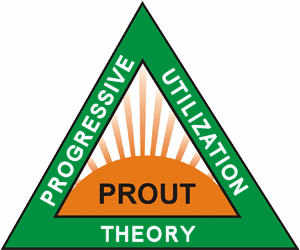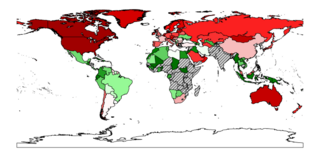Related Research Articles

Consumerism is a social and economic order that encourages the acquisition of goods and services in ever-increasing amounts. With the Industrial Revolution, but particularly in the 20th century, mass production led to overproduction—the supply of goods would grow beyond consumer demand, and so manufacturers turned to planned obsolescence and advertising to manipulate consumer spending. In 1899, a book on consumerism published by Thorstein Veblen, called The Theory of the Leisure Class, examined the widespread values and economic institutions emerging along with the widespread "leisure time" at the beginning of the 20th century. In it, Veblen "views the activities and spending habits of this leisure class in terms of conspicuous and vicarious consumption and waste. Both relate to the display of status and not to functionality or usefulness."
Overconsumption describes a situation where a consumer overuses their available goods and services to where they can't, or don't want to, replenish or reuse them. In microeconomics, this may be described as the point where the marginal cost of a consumer is greater than their marginal utility. The term overconsumption is quite controversial in use and does not necessarily have a single unifying definition. When used to refer to natural resources to the point where the environment is negatively affected, is it synonymous with the term overexploitation. However, when used in the broader economic sense, overconsumption can refer to all types of goods and services, including manmade ones, e.g. "the overconsumption of alcohol can lead to alcohol poisoning". Overconsumption is driven by several factors of the current global economy, including forces like consumerism, planned obsolescence, economic materialism, and other unsustainable business models and can be contrasted with sustainable consumption.

The concept of Global North and Global South is used to describe a grouping of countries along the lines of socio-economic and political characteristics. The Global South is a term generally used to identify countries and regions in the regions of Latin America, Africa, Asia and Oceania. Most of humanity resides in the Global South. Many countries in the Global South are characterized by low-income, dense population, poor infrastructure, often political or cultural marginalization, and are on one side of the divide; while on the other side is the Global North. As such, the terms Global North and Global South do not refer to the directional North-south as many of the Global South countries are geographically located in the Northern Hemisphere.

In sociology, the post-industrial society is the stage of society's development when the service sector generates more wealth than the manufacturing sector of the economy.
Eco-capitalism, also known as environmental capitalism or (sometimes) green capitalism, is the view that capital exists in nature as "natural capital" on which all wealth depends. Therefore, governments should use market-based policy-instruments to resolve environmental problems.
Dependency theory is the idea that resources flow from a "periphery" of poor and underdeveloped states to a "core" of wealthy states, enriching the latter at the expense of the former. A central contention of dependency theory is that poor states are impoverished and rich ones enriched by the way poor states are integrated into the "world system". This theory was officially developed in the late 1960s following World War II, as scholars searched for the root issue in the lack of development in Latin America.

The Progressive utilization theory (PROUT) is a socioeconomic and political philosophy created by the Indian philosopher and spiritual leader Prabhat Ranjan Sarkar. He first conceived of PROUT in 1959. Its proponents (Proutists) claim that it exposes and overcomes the limitations of capitalism, communism and mixed economy. Since its genesis, PROUT has had an economically progressive approach, aiming improve social development in the world. It is in line with Sarkar's Neohumanist values which aim to provide "proper care" to every being on the planet, including humans, animals and plants.

Underdevelopment, in the context of international development, reflects a broad condition or phenomena defined and critiqued by theorists in fields such as economics, development studies, and postcolonial studies. Used primarily to distinguish states along benchmarks concerning human development—such as macro-economic growth, health, education, and standards of living—an "underdeveloped" state is framed as the antithesis of a "developed", modern, or industrialized state. Popularized, dominant images of underdeveloped states include those that have less stable economies, less democratic political regimes, greater poverty, malnutrition, and poorer public health and education systems.

A steady-state economy is an economy made up of a constant stock of physical wealth (capital) and a constant population size. In effect, such an economy does not grow in the course of time. The term usually refers to the national economy of a particular country, but it is also applicable to the economic system of a city, a region, or the entire world. Early in the history of economic thought, classical economist Adam Smith of the 18th century developed the concept of a stationary state of an economy: Smith believed that any national economy in the world would sooner or later settle in a final state of stationarity.

World-systems theory is a multidisciplinary approach to world history and social change which emphasizes the world-system as the primary unit of social analysis.

Development theory is a collection of theories about how desirable change in society is best achieved. Such theories draw on a variety of social science disciplines and approaches. In this article, multiple theories are discussed, as are recent developments with regard to these theories. Depending on which theory that is being looked at, there are different explanations to the process of development and their inequalities.
Leopold Kohr (1909–1994) was an economist, jurist and political scientist known both for his opposition to the "cult of bigness" in social organization and as one of those who inspired the Small Is Beautiful movement. For almost twenty years, he was Professor of Economics and Public Administration at the University of Puerto Rico. He described himself as a "philosophical anarchist." His most influential work was The Breakdown of Nations. In 1983, he was awarded the Right Livelihood Award for "his early inspiration of the movement for a human scale."

Ecological debt refers to the supposed accumulation of debt of the Global North to Global South countries, due to the net sum of historical environmental injustice, especially through resource exploitation, habitat degradation, and pollution by waste discharge. The concept was coined by Global Southerner non-governmental organizations in the 1990s and its definition has varied over the years, in several attempts of greater specification.
The ecopedagogy movement is an outgrowth of the theory and practice of critical pedagogy, a body of educational praxis influenced by the philosopher and educator Paulo Freire. Ecopedagogy's mission is to develop a robust appreciation for the collective potentials of humanity and to foster social justice throughout the world. It does so as part of a future-oriented, ecological and political vision that radically opposes the globalization of ideologies such as neoliberalism and imperialism, while also attempting to foment forms of critical ecoliteracy. Recently, there have been attempts to integrate critical eco-pedagogy, as defined by Greg Misiaszek with Modern Stoic philosophy to create Stoic eco-pedagogy.
Postdevelopment theory holds that the whole concept and practice of development is a reflection of Western-Northern hegemony over the rest of the world. Postdevelopment thought arose in the 1980s out of criticisms voiced against development projects and development theory, which justified them.
Degrowth is a term used for both a political, economic, and social movement as well as a set of theories that criticise the paradigm of economic growth. Degrowth is based on ideas from political ecology, ecological economics, feminist political ecology, and environmental justice, arguing that social and ecological harm is caused by the pursuit of infinite growth and Western "development" imperatives.
Uneven and combined development is a concept in Marxian political economy intended to describe dynamics of human history involving the interaction of capitalist laws of motion and starting world market conditions whose national units are highly heterogeneous. The concept is used by Marxist scholars concerned with economic development. David Harvey is an advocate of the usefulness of this theory to reconstruct historical materialism on Modern terms. It is an accepted key concept in academic economic geography.
The commodification of nature is an area of research within critical environmental studies that is concerned with the ways in which natural entities and processes are made exchangeable through the market, and the implications thereof.

Environmental conflicts or ecological distribution conflicts (EDCs) are social conflicts caused by environmental degradation or by unequal distribution of environmental resources. The Environmental Justice Atlas documented 3,100 environmental conflicts worldwide as of April 2020 and emphasised that many more conflicts remained undocumented. Parties involved in these conflicts include locally affected communities, states, companies and investors, and social or environmental movements; typically environmental defenders are protecting their homelands from resource extraction or hazardous waste disposal. Resource extraction and hazardous waste activities often create resource scarcities, pollute the environment, and degrade the living space for humans and nature, resulting in conflict. A particular case of environmental conflicts are forestry conflicts, or forest conflicts which "are broadly viewed as struggles of varying intensity between interest groups, over values and issues related to forest policy and the use of forest resources". In the last decades, a growing number of these have been identified globally.

Environmentalism of the poor is a set of social movements that arise from environmental conflicts when impoverished people struggle against powerful state or private interests that threaten their livelihood, health, sovereignty, and culture. Part of the global environmental justice movement, it differs from mainstream environmentalism by emphasizing social justice issues instead of emphasizing conservation and eco-efficiency. It is becoming an increasingly important force for global sustainability.
References
- 1 2 3 4 Power, Marcus, "Anti-racism, deconstruction and 'overdevelopment' ", Progress in Development Studies, 2006; 6; p. 27
- ↑ Barkin, Samuel J. "Trade, Sustainable Development and the Environment", Global Environmental Politics 3:4, November 2003
- ↑ Kohr, Leopold (1977). The Overdeveloped Nations: The Diseconomies Of Scale. Swansea: Christopher Davies Publishers.
- ↑ "Ivan Illich. Medical Nemesis. Chapter 6: Specific Counterproductivity". www.soilandhealth.org. Retrieved 26 January 2020.
- ↑ "Ivan Illich: deschooling, conviviality and lifelong learning | infed.org" . Retrieved 25 January 2020.
- ↑ Hill, Ronald Paul, Peterson, Robert M., Dhanda, Kanwalroop Kathy, "Global Consumption and Distributive Justice: A Rawlsian Perspective", Human Rights Quarterly 23 (2001) 171–187, 2001.
- 1 2 Harvey, David, "Notes toward a theory of uneven geographical development", ch. 3 in Spaces of Global Capitalism: A Theory of Uneven Geographical Development, Verso (2006). ISBN 1-84467-550-5